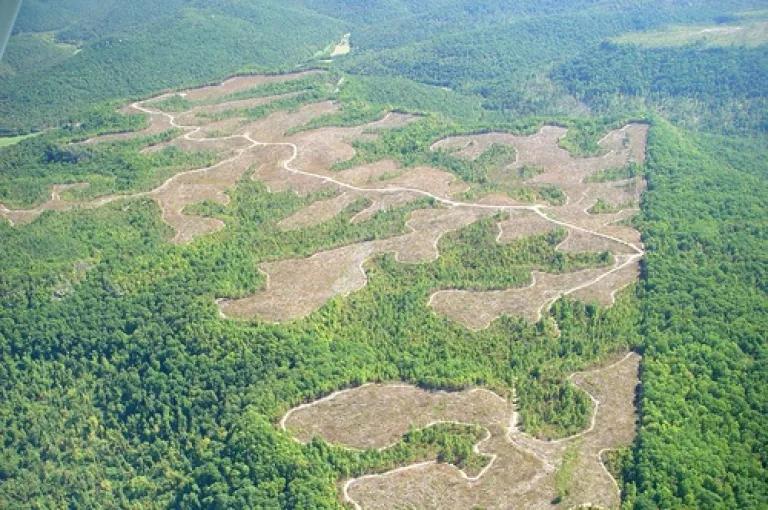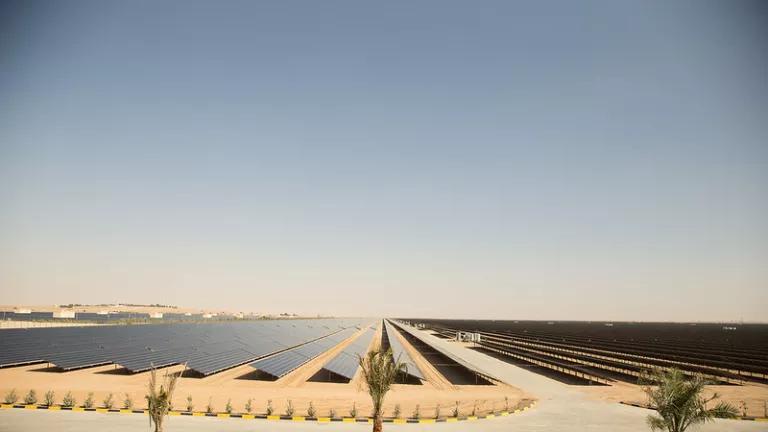How European power companies skirt their own environmental rules by logging U.S. forests for fuel
When European Union leaders mandated that 20% of Europe's energy should come from "renewable" sources, do you think they envisioned an industry where many millions of tons of trees harvested from U.S. forests would be loaded onto cargo ships and shipped across the ocean to be burned in European power plants?
Probably not.
When these same leaders put rules in place to protect European forests, do you think they meant for E.U. companies to go chop down forests in other countries?
Probably not.
But as crazy as it sounds, European energy companies and wood pellet manufacturers are cutting down forests in the U.S. Southeast so they can be burned for energy in large-scale power plants in the E.U.—a practice that is widespread and growing at an alarming rate.
That’s why NRDC and our partners at Dogwood Alliance have launched the Our Forests Aren’t Fuel campaign. We are calling for an immediate moratorium on the use of whole trees in pellet manufacturing and utility-scale biomass projects until companies adopt long-term policies that verify that their projects:
- Will reduce near-term carbon emissions compared to fossil fuels;
- Will not adversely impact forests, carbon sinks, soil, wildlife habitat, biodiversity and water resources; and
- Will not result in net increases to local air pollution.
European utilities are the biggest drivers of expanded demand in the region for wood as a fuel source, led by the UK’s Drax Power and its U.S.-based supplier Enviva. The massive fuel needs of these energy companies could double logging rates in the Southeast, threatening some of the most biologically-diverse forests in the world.
Not only is it happening, but these energy companies are actually being subsidized for burning trees under European renewable energy policies.
Drax has announced plans to turn the U.K.'s biggest coal-fired power plant into Western Europe's largest biomass plant. Once these investments are completed, Drax expects to burn about seven million tons of wood annually, requiring quantities of woody biomass equivalent to harvesting a forest four times the size of Rhode Island each year[i] or more than the total wood harvest from all UK forests. The company will in turn collect about $600 million a year from renewable energy credits.
But as the Wall Street Journal (WSJ) points out in their in-depth look at this new trans-Atlantic biomass industry:
“Europe doesn't have enough forests to chop for fuel, and in those it does have, many restrictions apply. So Europe's power plants are devouring wood from the U.S., where forests are bigger and restrictions fewer.”
“The logging is perfectly legal in North Carolina and generally so elsewhere in the U.S. South. In much of Europe, it wouldn't be.”
That’s right. Whereas UK regulations strictly control large-scale tree-cutting, largely prohibit clear-cutting of wetland forests, and require specific management practices when forests are being harvested—with other European countries completely outlawing clear-cutting of forests—clear-cutting is a common logging practice in the U.S.
Here’s what that looks like:

As the WSJ concludes:
"U.S. wood thus allows EU countries to skirt Europe's environmental rules on logging but meet its environmental rules on energy."
The result of this short-sighted energy policy is peril for our most ecologically precious forests.
The South is home to more plant and animal species than anywhere else in North America and its forests protect the world’s most diverse freshwater ecosystems. It contains the greatest diversity of freshwater wetland communities on the continent and ranks among the top ten in the U.S. and Canada for numbers of reptile, bird and tree species. Beyond biological diversity, these forests, like forests around the world, protect drinking water for millions of people, prevent flooding and serve as vital carbon sinks.
The BBC documented that the biomass energy industry uses wood from giant monoculture plantations, which drive conversion of natural forests, commonly rely on the routine use of toxic herbicides and fertilizer, and bear little to no resemblance to healthy forests. But the BBC also exposes an even more sinister trend: industry is quietly harvesting wood from natural forests. Less than 2% of forestland in the South is protected. The vast majority is in the hands of private landowners and faces no laws or restrictions on forestry practices—a real “Wild West” where biomass energy companies can claim that they are abiding by the law while continuing their destructive forestry practices. As illuminated by the WSJ story, some of the wood being sold to Enviva for pellets has even come from forests that are over 100 years old.
Rising demand for wood-generated electricity—in the absence of adequate policies to protect our forests—risks irreversible damage to our cherished Southern forests. But there’s time to turn the industry around.
We can’t allow our most valuable forests to be destroyed in the name of renewable energy. Help put an end to this destructive practice. Tell these companies that burning trees for energy isn’t green!
[i] Bloomberg: "Biggest English Polluter Spends $1 Billion to Burn Wood", September 26, 2012. See: http://www.bloomberg.com/news/2012-09-25/biggest-english-polluter-spend…



